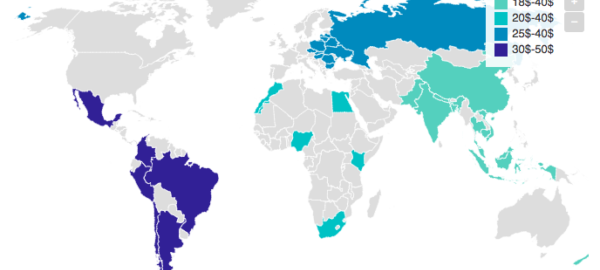— June 12, 2019
Offshore software development is all the rage
Outsourcing is nothing new. For decades now, companies have been hiring offshore developers instead of seeking tech professionals at home. Saved time and money plus access to a goldmine of IT talent is what makes this software development approach so popular. In fact, in 2017, the total contract value of the IT outsourcing market has reached $ 64,3 billion. And chances are, this number will only continue to grow.
But what makes companies consider hiring a development team overseas? What are the factors that make them rely on an overseas professional instead of an in-house developer? Are there any particular use cases when a dedicated development team would do a better job? Absolutely! That’s why I’m going to take a look at some of them in this article.
Why consider hiring overseas?
First, let’s find out why businesses contemplate working with a dedicated development team in the first place. There’s a myriad of reasons why companies choose to turn to offshore software development. Roughly, they can be divided into two groups: the “push” factors and the “pull” factors.
The “push” factors
If a company considers the “push” factors for outsourcing software development, it means that it isn’t even an option for them. The following factors force companies into hiring dedicated teams overseas.
Lack of tech talent
The shortage of skilled workers may be a real problem. And we’re not even talking about the lack of tech talent within a company or a city. Not every country can boast a large talent pool. In other words, it can be very challenging to build a strong local team that delivers excellent code, not to mention how hard it is to find a domain specialist for the project. And even if you do, how can you tell they will be available at the exact time you’ll need them?
High payment rates
The average payment rates of software developers, testers, PMs and BAs vary from country to country. It’s natural. Take the USA, Japan, and Switzerland, for example. In these countries, the average software development salary is the highest in the world. Keeping that in mind, would you want to hire an entire development team in one of those countries, provided the quality they deliver is the same as in Eastern Europe?
The in-house team can’t cope with the task
When a company already has its own development team, it makes sense to hold the development in-house. But what if they lack specific expertise for the project or are overloaded with other work?
Adding new people to the team won’t cut it: the lengthy hiring process doesn’t guarantee the candidate will start bringing value right away. This is when lots of companies decide to extend their teams overseas.
The “pull” factors
Being guided by the “pull” factors is more pleasant than dealing with the “push” situations. “Pull” factors are the things that make outsourcing attractive to businesses worldwide.
Reasonable price
If an IT company needs to save money, hiring tech professionals from outsourcing vendors is usually the way to go. True, some vendors charge more than others, but that’s still more reasonable than supplying an entire in-house software development team. Eastern Europe, Asia, Latin America, and Africa have become popular outsourcing destinations with rates varying from 18$ to 50$ . Simply put, offshore software development allows businesses to save money by finding a better deal.

Large talent pool
Hiring a development team overseas means gaining access to a larger pool of IT professionals. In fact, according to the HackerRank’s research, the most outstanding programmers live in China, Russia, and Poland. Outsourcing also makes it easier to find workers with a unique set of skills. The excruciating process that can take months if you’re only looking for domestic developers can feel like a walk in the park once you decide to outsource.
Cooperation flexibility
Whether you have a small, seasonal project or an enterprise-level solution, outsource development is a good idea thanks to the cooperation flexibility. When your contract expires, you part ways with the outsourcing vendor, no hard feelings. Then again, if you like what they deliver, you can choose to extend the contract. No need to fire anyone or keep them on the bench for forever. Perfect.
Is a dedicated development team better than an in-house one?
While many companies decide to outsource, some keep all the development to themselves. Let’s take a final look through a dedicated team model and see how it differs from the traditional in-house software development.
Pssst, be attentive. Once you finish reading this article, you will find yourself looking for dedicated developers overseas. Are you ready for this? Then keep reading.
A dedicated team is a group of software development professionals who work on the customer’s project exclusively. In other words, they stay focused on the job as if they were working in-house. You’d have to say, this model offers many benefits compared to in-house software development.
#1 Cost efficiency
It is clear that by hiring a dedicated development team, IT companies can save money. And we’re not just talking about the lower rates of overseas programmers. The price is also lower because, with a distributed development team, there is no need to pay for the office, sick leaves, and payroll taxes. The overhead is none of your business.
#2 Talent and technology diversity
An in-house team of developers is limited by the fields its tech professionals specialise in. By contrast, when you hire a dedicated development team, you can find a niche expert quickly and painlessly.
Also, the in-house team isn’t usually eager to learn new approaches and technologies since they’re often stuck on the same project, doing the same thing. On the other hand, a dedicated team can take advantage of the latest trends and offer advanced solutions because they are more agile and have experience working with various customers.
#3 Scalability and flexibility
An in-house development team has a significant drawback: it’s not scalable. Okay, it’s scalable in theory, but hiring and firing in-house workers is exhausting physically, financially and emotionally.
Meanwhile, a dedicated team of developers is flexible and scalable seamlessly both up and down. Your team of in-house software developers can get a boost from overseas programmers anytime, and, most importantly, at the right time.
This way you’ll be able to speed up the development process at specific stages. For instance, when a startup has to complete an MVP faster, the team can engage more developers to finish the project on time. Similarly, a dedicated team can shrink when the delivered product only needs support at the final stages.
#4 Increased productivity and saved time
A dedicated development team is generally faster than an in-house one since it only focuses on a single project and its efforts aren’t sprinkled around on other tasks.
Thanks to scalability, with a dedicated team, the time-to-market delivery is faster. Not to mention all the time you save on recruitment. It usually takes around 35 days to hire a single software developer. And what if you need five of them, a QA engineer plus a PM and your only recruiter is also an HR and an office manager?
#5 Excellent communication and teamwork
It’s no secret that transparent and timely communication is a major part of a project’s success while repetitive miscommunication can drag the whole thing down. Usually, a dedicated team of developers consists of people who are used to working in different situations and interacting with different team members.
Key takeaways
Outsourcing developers are flexible and have great soft skills. That is why communicating with both the customers and the co-workers is never a problem for a dedicated team of developers.
All in all, a dedicated development team is more cost-effective, flexible, scalable and productive than an in-house one. That’s why hiring developers overseas is a good step to take.
Not only will your business benefit from more cost-effective and high-quality work, but also you’ll be blown away by talent diversity and flexibility demonstrated by dedicated teams.
Offshore software development is an opportunity. Go for it!
Business & Finance Articles on Business 2 Community
(85)
Report Post





